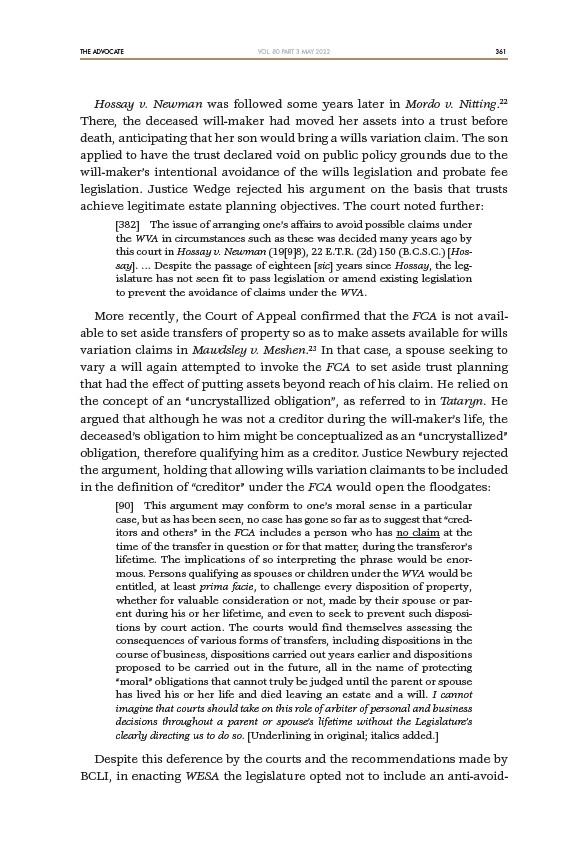
THE ADVOCATE 361
VOL. 80 PART 3 MAY 2022
Hossay v. Newman was followed some years later in Mordo v. Nitting.22
There, the deceased will-maker had moved her assets into a trust before
death, anticipating that her son would bring a wills variation claim. The son
applied to have the trust declared void on public policy grounds due to the
will-maker’s intentional avoidance of the wills legislation and probate fee
legislation. Justice Wedge rejected his argument on the basis that trusts
achieve legitimate estate planning objectives. The court noted further:
382 The issue of arranging one’s affairs to avoid possible claims under
the WVA in circumstances such as these was decided many years ago by
this court in Hossay v. Newman (1998), 22 E.T.R. (2d) 150 (B.C.S.C.) Hossay.
… Despite the passage of eighteen sic years since Hossay, the legislature
has not seen fit to pass legislation or amend existing legislation
to prevent the avoidance of claims under the WVA.
More recently, the Court of Appeal confirmed that the FCA is not available
to set aside transfers of property so as to make assets available for wills
variation claims in Mawdsley v. Meshen.23 In that case, a spouse seeking to
vary a will again attempted to invoke the FCA to set aside trust planning
that had the effect of putting assets beyond reach of his claim. He relied on
the concept of an “uncrystallized obligation”, as referred to in Tataryn. He
argued that although he was not a creditor during the will-maker’s life, the
deceased’s obligation to him might be conceptualized as an “uncrystallized”
obligation, therefore qualifying him as a creditor. Justice Newbury rejected
the argument, holding that allowing wills variation claimants to be included
in the definition of “creditor” under the FCA would open the floodgates:
90 This argument may conform to one’s moral sense in a particular
case, but as has been seen, no case has gone so far as to suggest that “creditors
and others” in the FCA includes a person who has no claim at the
time of the transfer in question or for that matter, during the transferor’s
lifetime. The implications of so interpreting the phrase would be enormous.
Persons qualifying as spouses or children under the WVA would be
entitled, at least prima facie, to challenge every disposition of property,
whether for valuable consideration or not, made by their spouse or parent
during his or her lifetime, and even to seek to prevent such dispositions
by court action. The courts would find themselves assessing the
consequences of various forms of transfers, including dispositions in the
course of business, dispositions carried out years earlier and dispositions
proposed to be carried out in the future, all in the name of protecting
“moral” obligations that cannot truly be judged until the parent or spouse
has lived his or her life and died leaving an estate and a will. I cannot
imagine that courts should take on this role of arbiter of personal and business
decisions throughout a parent or spouse’s lifetime without the Legislature’s
clearly directing us to do so. Underlining in original; italics added.
Despite this deference by the courts and the recommendations made by
BCLI, in enacting WESA the legislature opted not to include an anti-avoid-